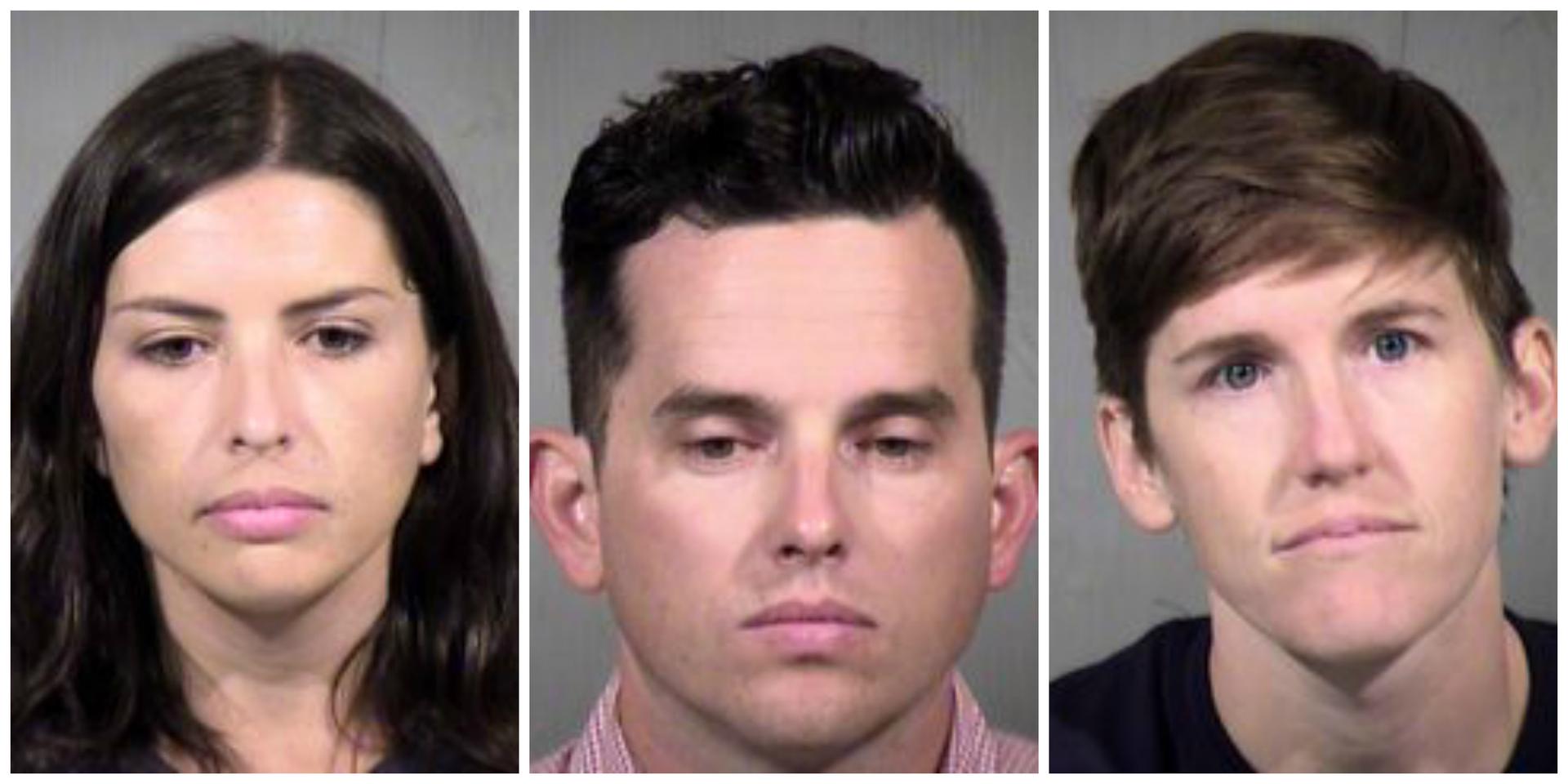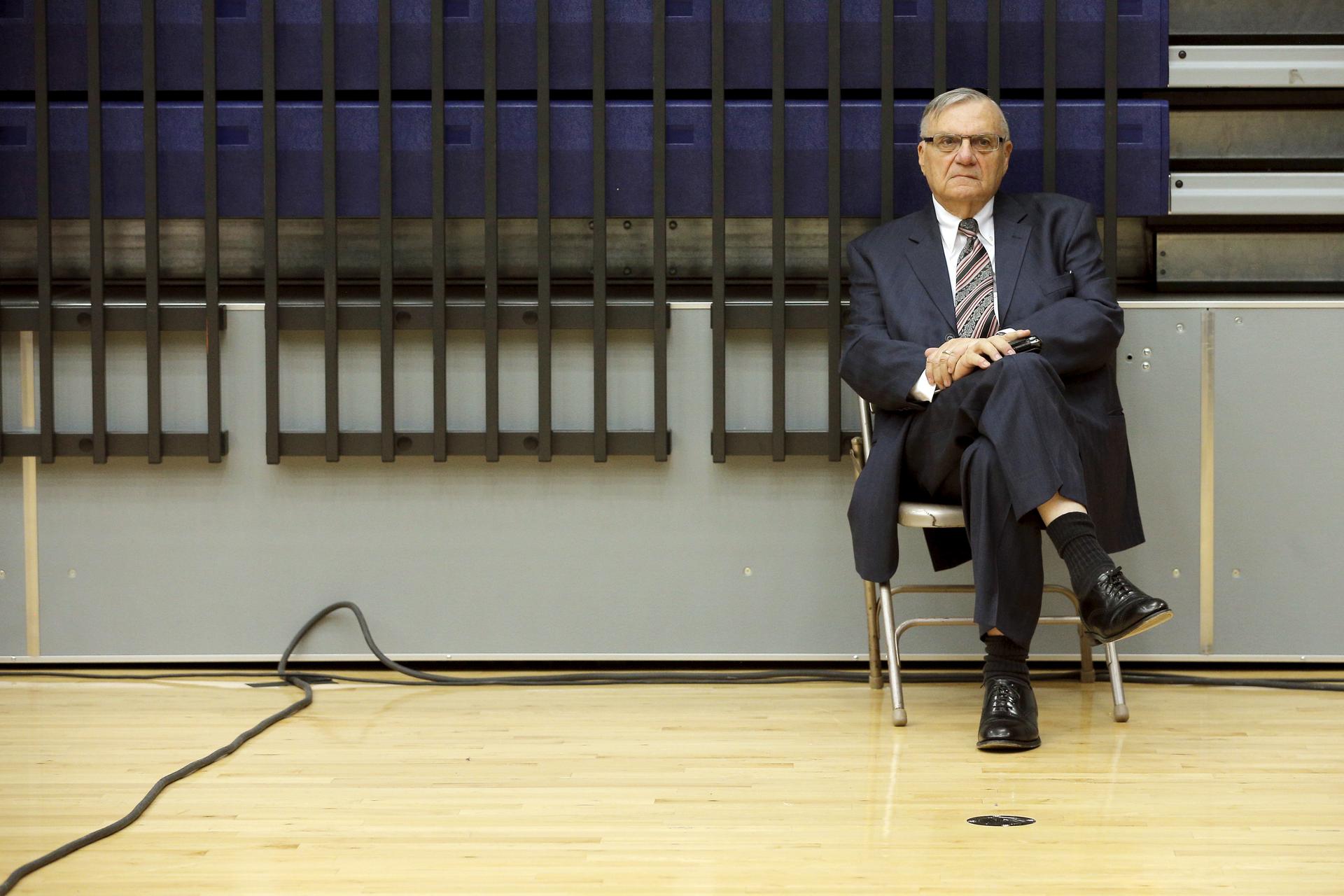Jacinta Gonzalez locked herself to a vehicle on Mar. 19 to block the road to a Trump rally in Fountain Hills, Arizona. She was arrested with two other protestors, who were released that night. She was held detained overnight at the request of US Immigration and Customs Enforcement. Gonzalez is a US citizen.
When Jacinta Gonzalez arrived at a protest on Shea Boulevard in Fountain Hills, Arizona, the morning of March 19, it wasn't just for a Trump rally. It was because of a kind of Trump ideology.
"We decided to take action and shut down Trump because we understand that he's more than just a candidate," she says.
Gonzalez talks about the "Trump effect" almost as much Donald Trump himself. She worries he is "riling up" politics of racism, Islamophobia and homophobia.
"We've already seen it permeate our community," she says, pointing to bills related to immigration and refugees in state and local governments. There are four such bills in Arizona's house and one in the senate, which critics say curtail immigrants' rights and foment racial divides.
Protesters' vehicles blocked the highway that led to the rally until they were towed about 45 minutes later, she estimates. Then, she joined a few other protesters who chained themselves to vehicles. They were able to further delay traffic for about an hour, and traffic backed up for a mile.
Predictably, Gonzalez was arrested, along with two other protestors. She was ready for that. Gonzalez, 30, has been an activist on immigration and deportation issues for 10 years. She's the field director for Mijente, an organization born largely from the #Not1MoreDeportation campaign that now advocates for issues that matter to Latinos, broadly.
The three protestors were taken to the Fourth Avenue jail in Phoenix, about 30 miles away. The jail is part of the Maricopa County Sheriff's Office, which is led by Trump supporter Sheriff Joe Arpaio. Arpaio introduced Trump at his Fountain Hills rally that day. He announced that the three protestors were in jail and said, "If they think they're going to intimidate you and the next president of the United States, it's not going to happen. Not in this town, I tell you right now."
“You have some sheriff. There’s no games with your sheriff, that’s for sure,” Trump told the crowd when he took the stage.
Arpaio is known for his aggressive targeting of undocumented immigrants. In 2012, the US Justice Department sued Arpaio for racial profiling of Latinos. Maricopa County opted for a settlement last July. Under the terms of the settlement, the sheriff's office must "establish an official policy prohibiting retaliation against any individual for any individual's lawful expression of ideas in the exercise of the First Amendment right to the freedom of speech."
Gonzalez and the two other protesters were in the booking area together, where they were processed, fingerprinted and patted down. That's when, she says, two agents called her by name to come up to the counter. Gonzalez says she was the only one in the booking area who was called up. They began asking questions including, "What's your immigration status?"
Gonzalez replied, "I want an attorney present to answer your questions."
"Oh, so you're illegal," one of the agents replied, she recalls. They asked if she is a citizen. She refused to answer. She had provided her Louisiana drivers license, name and date of birth — enough to check databases and verify her status.
The agents then told her that they were issuing an immigration detainer, which is a request by ICE for the Maricopa County Sheriff's Office to hold a suspect and turn him or her over to immigration officials once they complete their investigation.
Chris Hegstrom, the director of public information for the Maricopa County Sheriff’s Office, says this was all standard procedure. The ICE agents are stationed at the Fourth Avenue jail and question everyone who comes through, he says.
"If you were arrested today, you would be interviewed by ICE," Hegstrom says. "If I were arrested, I too would be interviewed by ICE."
The two other protestors, both white men, told The Republic they were never questioned by the agents nor were they asked about their immigration status.
About 8 p.m., the three protestors were seen by a judge. They were released on their own recognizance and will face misdemeanor charges for obstructing a highway. By late that night, 11 p.m. or midnight, Gonzalez estimates, the jail finished processing them. The two other protestors were released; Gonzalez was kept in jail overnight, in isolation, she says.

Hegstrom says ICE requested the jail hold Gonzalez until they came to pick her up. Other agencies have to follow different rules to have the sheriff's office hold someone in jail. "When a local agency wants to place a hold on somebody they have to show us a probable cause statement to show us why they want us to hold them. ICE does not," he says. "When they put a hold on somebody, we don't know why."
"We processed [the three protestors] like everybody else. We have nothing to do with ICE," he says.
Also: Many women seeking asylum in the US have been released from detention — but with ankle monitors
In the morning, ICE agents came to claim Gonzalez. Hegstrom says this kind of handover to ICE happens once each day, in the morning. They shackled her and took her to the Phoenix field office where they began to question her. Again, she refused to answer questions. They allowed her to call her attorney. Before her counsel could arrive, less than 30 minutes later, they told her that they know she is a US citizen and let her go.
Yasmeen Pitts O'Keefe, spokesperson for ICE in Phoenix, said by email that ICE agents stationed at the Fourth Avenue jail questioned all three protestors.
"Of the three individuals arrested by local authorities at Phoenix political rallies this weekend who were booked into the jail, two advised ICE officers during their interviews they were US citizens. As such, ICE took no further enforcement action," she writes. "The third individual declined to provide ICE officers information, other than acknowledging being foreign born. As a result, that person was subsequently transferred to ICE custody. However, the individual was released within an hour after database checks determined the person currently holds a valid United States passport.”
Last fall, the Department of Homeland Security outlined new priorities for detention and deportation, which say resources should be dedicated as much as possible to people who are threats to public safety and have committed multiple crimes. The guidelines, known as PEP, also led to new immigration detainer forms. So far, ICE has not revealed which form was used in this case, or are used generally in Maricopa County jails. PRI has made a Freedom of Information Act request for documents related to ICE's current relationship with the sheriff's office and the types and numbers of detainers that are issued.
Cecillia D. Wang, director of the ACLU Immigrants' Rights Project, says what happened to Gonzalez is part of ongoing issues with the sheriff's office and their relationship with ICE. In 2013, Arpaio and his office lost a class-action lawsuit brought by the ACLU for racially profiling Latinos in traffic stops.
In 2011, the federal government withdrew agreements with Maricopa County that deputized local officers to assist in immigration enforcement. This restricted the sheriff's access to databases, but did not preclude them from complying with ICE requests.
"What happened to this woman should serve as a warning sign to the federal government that they shouldn't be doing business with Arpaio, they shouldn't be issuing detainers," says Wang. "Issuing detainers is widely know to give local agencies the incentive to make arrests for minor violations of state law in order to get people into the jail."

Christopher Lasch, a professor at Sturm College of Law at the University of Denver who studies the use of detainers, says cooperation between ICE and local law enforcement to detain people is troubling. The Fourth Amendment protects people from unreasonable search and seizure, and that ICE does not have to show cause to detain someone is a violation of that right, he says.
"This case shows what a lot of people worry about, that in fact they don't do any investigations before they issue a detainer," says Lasch. "The problem is that there's just an open question as to whether they have in fact have decided to follow the Fourth Amendment."
Gonzalez believes she was racially profiled, that she was singled out because of her name and her appearance. "ICE agents across the country, both inside and outside of jails, are accustomed to racial profiling — to asking people questions without attorneys present, without them knowing their constitutional rights," she says.
"They want to put the burden of proof on you, instead of doing their jobs," Gonzalez says. "Folks assume or expect that because you're a citizen, you should just be able to say so and deserve a way of being treated. But we have the burden to defend our constitutional rights."
Those rights include being able to ask for counsel without fear of retaliation, she says.
The night in jail was humiliating and uncomfortable, but Gonzalez is more concerned about other people who are in immigration detention, people who are separated from their families, don't know their rights or don't speak English. And she is worried about what a Trump presidency would mean for constitutional rights in America.
"I'm 10 times more afraid of the pain and uncomfortableness that would come about if Trump becomes president," she says. "I'm more afraid of that than one or two nights in jail."